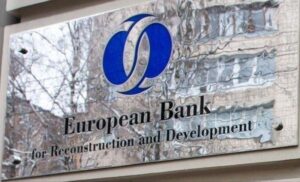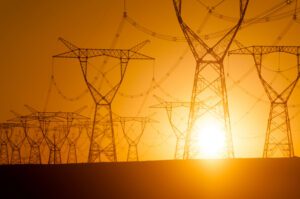
NEC Ukrenergo and the European Bank for Reconstruction and Development signed an agreement on a EUR70mn target grant to the company from the bank’s Special Fund provided by the government of the Kingdom of the Netherlands, NEC CEO Volodymyr Kudrytskyy said.
As Kudritsky explained on his Facebook, the funds will be used exclusively to purchase the equipment needed to resume the reliable operation of Ukraine’s energy infrastructure.
“We are grateful to our international partners for such a high level of confidence in our company and strong support in the restoration of Ukraine’s energy system. We are now actively working with manufacturers around the world to deliver the necessary equipment as soon as possible,” said the head of Ukrenergo.
As earlier reported, at the beginning of December, NEC Ukrenergo noted that it had attracted EUR300 mln of credit funds from the EBRD, EUR150 mln of which would be allocated for the purchase of equipment necessary for substations that have been subject to massive Russian missile strikes.
The rest EUR150 mln of the EBRD loan will be used to replenish Ukrenergo’s working capital, in particular, to fulfill the company’s financial obligations in the electricity market amid the non-payments that arose in the market because of the war.
At the same time, there was also talk about attracting EUR72 million in grant funds from the Netherlands to restore networks and improve the financial stability of the company.

The German government through the Reconstruction Credit Institution (KfW) will lend EUR32.5 million to Ukrenergo to restore eight high-voltage substations in the south and west of Ukraine, the company said.
According to its Facebook post on Friday, Ukrainian Finance Minister Serhiy Marchenko and NEC Board Chairman Volodymyr Kudrytsky signed the relevant agreements with KfW. This is NEC’s third project with the German state bank KfW, through which its government is providing financial support to Ukrenergo.
“These funds will already be working in the interests of Ukrainian consumers in the near future: equipment will be installed at the substations that will make it possible to control their work remotely from the central dispatcher’s office. The restored substations will be automated, require minimal staff and meet ENTSO-E requirements for reliability of the power transmission system and grid safety,” explained Ukrenergo.
The company expressed its sincere gratitude to its European partners for their timely assistance, which is very much needed today.
For its part, the Ministry of Finance said on its website that its head during a meeting with Anka Feldhusen, Ambassador Extraordinary and Plenipotentiary of Germany to Ukraine, signed a guarantee agreement with KfW for the new project “Increasing the Efficiency of Power Transmission (Substation Modernization) II”, and Ukrenergo head signed a loan agreement with KfW for EUR32.5 million for this project.
During the meeting there were also signed agreements on debt deferral between the government of Ukraine and KfW, the Ministry of Finance pointed out.
According to its report, an agreement was reached to postpone repayment of Ukraine’s debt under the attracted loans from KfW under the four existing projects from 2022-2023 to 2027-2031.

The European Bank for Reconstruction and Development (EBRD) has approved a financing package under which NPC Ukrenergo will be allocated EUR 372 million to support urgent repair of damage caused by Russian bombing of civil energy infrastructure.
According to the bank’s press release, the company will be provided with a state-guaranteed loan of EUR 300 million, as well as a grant of EUR 72 million from the Netherlands.
In particular, EUR 150 million is provided for the purchase of equipment for emergency recovery work, another EUR 150 million is provided for the support of the capital structure of the NPC. Separately, part of the emergency repair loan will be supplemented by a grant from the Netherlands.
“This will be blended into a single EUR 372 million package to support the immediate transmission infrastructure restoration needs of Ukrenergo,” the EBRD said.
The Bank says that EBRD investments in Ukraine are made with the support of donors and partners. The United States of America, which has contributed $500 million to the EBRD’s Crisis Response Fund and is strongly committed to addressing to the impact of the war on Ukraine, will support up to 50 per cent of the EBRD’s loan with a funded guarantee.
“Urgent repairs on Ukraine’s electricity network is an immediate priority for the EBRD. The Ukrainian people and businesses need continued access to electricity to go through the winter. With this important financing, we will help Ukrenergo perform swift emergency repairs of damaged equipment, high voltage substations and transmission lines. It will ensure the continued provision of vital power transmission services during the heating season for Ukrainian households, businesses and communities,” said EBRD President Odile Renaud-Basso.
“The EBRD condemns in the strongest possible way the unprovoked and unjustified Russia-led war on Ukraine and especially the strikes on civilian infrastructure,” the message reads.

Since the beginning of the Russian aggression, NPC Ukrenergo has received assistance in the form of supplies of equipment and materials from five European transmission system operators (TSOs) represented by the Belgian Elia, the Polish PSE, the Italian Terna, as well as the German Amprion and 50 Hertz, the company reported in its Telegram channel on Tuesday.
“Since the beginning of the war, European TSOs have been helping us at their own request so that our repairmen can quickly restore networks destroyed by enemy rocket attacks. They personally make sure that the equipment is delivered as quickly as possible,” the company said.
The last batch of aid and equipment came from the Belgian Elia.
“Belgian colleagues have provided new generators, insulators for overhead power lines, wire and couplings for their connection with a total cost of several hundred thousand euros,” the company said.
As the company said, the very first aid came in March from the Polish system operator PSE, which also provided transformer equipment to the Ukrainian side at the end of May, including from its own emergency stock.
“In addition, Polish colleagues ordered and paid for the manufacture of 70 km of wire, which our repairmen are already using today, specifically for Ukrenergo,” the company added.
In July, Vitaliy Krush, an employee of one of the largest German TSOs Amprion, delivered two generators to the Ukrainian border for Ukrenergo substations.
“Also, equipment for the Ukrainian system operator was provided by another German operator 50Hertz and Italian Terna. Various equipment is expected from other OSB and international partners,” the company said.
As explained in Ukrenergo, system operators, like no one else, understand the importance and complexity of the rapid restoration of infrastructure in Ukraine.
“We greatly appreciate every contribution to the fact that our mobile repair teams can quickly restore damaged networks, replace transformers destroyed by enemy missiles,” Ukrenergo said.

Repair crews of NPC Ukrenergo are already working to eliminate the consequences of a Russian terrorist attack on energy infrastructure facilities in the central and northern regions of Ukraine.
“The situation in the power system is under control. However, the Ukrenergo dispatch center does not rule out the possibility of introducing emergency shutdown schedules. Therefore, it is important to save electricity consumption throughout the country, especially in the evening hours,” the company said in a statement.

The European Bank for Reconstruction and Development (EBRD) will provide transmission system operator NPC Ukrenergo with EUR97.3 million in support of liquidity in the face of Russia’s military aggression.
“The EBRD and the Ukrainian authorities have agreed to change the purpose of the remaining EUR97.3 million from an existing loan to Ukrainian electricity transmission system operator Ukrenergo. The new purpose of the funds is to maintain the company’s liquidity,” the bank said in a press release on Friday.
It clarifies that in this way the bank will repurpose part of the EUR149 million loan provided in 2019 to support liquidity to modernize key elements of the electricity transmission infrastructure in order to support the stable operation of the system and synchronize with European electric networks, as well as to help Ukraine bring its legislation and operating principles in accordance with the requirements of the Third Energy Package of the EU.
“Due to the war, Ukrenergo has urgent liquidity needs, so the company has asked to repurpose the undrawn funds. This liquidity support from the EBRD will ensure the stable operation of the Ukrainian energy system, nuclear and renewable energy generation capacities, as well as the supply of electricity to industrial consumers and population,” the release notes.
The EBRD notes that during the war, the company faced significant customer defaults and a 30% drop in electricity consumption, resulting in a loss of revenue.
At the same time, they specified that up to half of EUR97.3 million would be guaranteed by a sovereign donor from the G7 countries.
The bank noted that the support provided is part of the EUR1 billion investment it promised before the end of the year to support the Ukrainian economy on the terms of risk-sharing with donors and partners.
The release recalls that in May Ukrenergo already received EUR50 million as part of the reassignment of a previously granted loan.
Ukrenergo reported that these funds were used to repay debts in the ancillary services market, and also noted that it was counting on new reprofiling of loans to support liquidity, in particular, to repay debts in the balancing market.